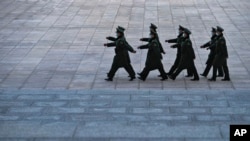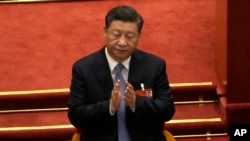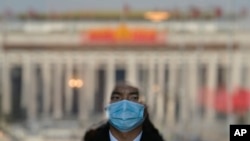Thousands of politicians from across China are set to convene in Beijing for the start of the country's annual legislative meetings known as the "lianghui" or "Two Sessions."
The tightly controlled voting on legislation already pre-approved by China's ruling Communist Party is unlikely to implement any major changes.
But it does provide a glimpse into the country's politics and priorities, with observers focused on the specific economic targets set as the country emerges from its "zero-COVID" policy, as well as institutional shake-ups and political horse-trading.
Here's what you need to know:
What are the 'Two Sessions'?
The first one, which is due to kick off Saturday, is the gathering of China's political advisory committee, the Chinese People's Political Consultative Conference (CPPCC).
The group's members — who have included many of China's most famous celebrities, such as Yao Ming and Jackie Chan — receive a lot of attention at home, but its discussions are relatively low stakes: representatives provide lawmakers with policy suggestions that, often, have little impact on national policy.
The real focus of the "Two Sessions" is the meeting of the National People's Congress (NPC), the country's legislature, starting Sunday at Beijing's Great Hall of the People.
Two-thirds of the legislature's members come from the Communist Party.
Most of the bills that will be passed have already been decided by party leaders well in advance, leading to it being described as a "rubber-stamp" parliament.
How important is it?
China goes to great lengths to make sure there are no embarrassing incidents during the parliamentary session, which is touted by the Communist Party as proof that it answers to the people despite its monopoly on power.
The meeting place in the Great Hall of the People is freshened up, traffic is shut down, factories are closed to guarantee blue skies, plainclothes policemen seem to lurk on every corner, and political dissidents are rounded up and asked — or sometimes forced — to go on "vacation" somewhere far away from the capital.
It is also the one time each year when the country's most powerful politicians are all in one place, making it a key venue for political horse-trading, glad-handing and backstabbing.
Every five years, the parliamentary session also sees the appointment of the president —this year Xi Jinping is expected to start his third term in the position, complementing two top Communist Party positions he secured at a Congress last October.
This gathering will be the first since China reversed its stringent "zero-COVID" policy, although media attendees have been asked to quarantine at a hotel the evening before it begins — indicating a lingering unease with the virus.
What are the top issues?
Post-pandemic economic recovery will be the top focus of many observers this year, as analysts expect a modest GDP growth goal for 2023 of around 5.3 percent.
A communique released this week following the conclusion of a plenary session for the 20th Central Committee revealed that the meetings will include discussions of "a plan on reform of Party and state institutions," causing experts to speculate that an overhaul of the country's security apparatus may be in the works.
And the release of details on military spending will offer signals of China's confidence in current geopolitical conditions, from tensions in the Taiwan Strait and Russia's conflict in Ukraine.
Observers also will be closely assessing any plans announced on the allocation of public resources into key technological sectors or major infrastructure development projects.






